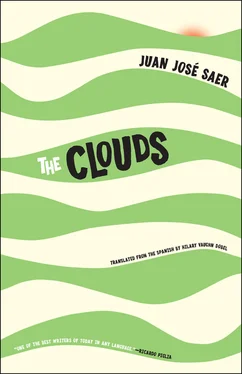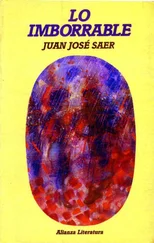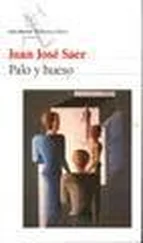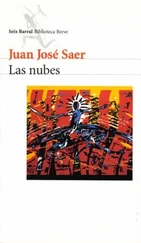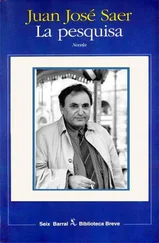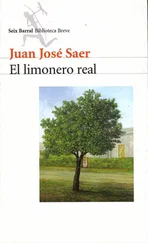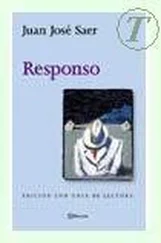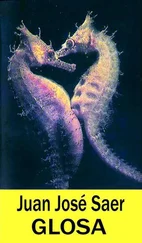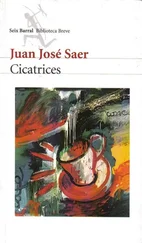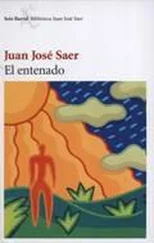It will sound like fiction to my readers, but we awaited the water eagerly for days, and in place of water came fire. It was the twenty-ninth of August, 1804. If this precision awakens the suspicions of my potential reader, suggesting that I employ it to increase the illusion of truthfulness, I would like it to remain quite clear that this date is unforgettable for me, as it marks the most extraordinary day of my life.
For many hours, a strong smell of burning, which had grown stronger and more unmistakable, prompted comments in the caravan, but as no breeze was blowing and there were no visible signs of fire along the horizon, it proved difficult to identify the source of the smell. Osuna’s concern, and his secret meetings with Sergeant Lucero and with Sirirí, were the only tangible proof to me that the invisible yet pervasive fire was very real, so when Sirirí left to explore southward and Osuna suggested we alter the course to the east a bit, I realized that the situation appeared far more serious to our experts than I had imagined. Osuna explained to me that if there was a fire, it might be coming from the south, which was why Sirirí had ridden that way — to determine at what distance it was coming up against us — and that the caravan was going east because the fire had less chance of spreading on the wetlands near the river. According to Osuna, if there was a fire, which was all but certain, the origin was likely some thunderbolt in one of those dry storms that sometimes advance a few days before the torrential rains that sweep down on the region. With regard to the fire, and always according to Osuna, it could be a small matter or, to the contrary, form a front for many leagues; the heat and dry grass would help it spread slowly in the absence of wind, but if by chance the southeaster that came to accompany the Santa Rosa storms began to blow, the speed of propagation would multiply in no time. Thus, Osuna and Lucero had taken the precaution of altering our route toward the river.
Osuna, glancing frequently and nervously to the south, meant for us to hurry, but, if I haven’t said it before now, I believe that now is the time to point out that, though drawn by four horses and faster than ox-drawn freight wagons, even without considering the patients we were transporting, our carts moved quite slowly. Our trip had dragged on, not just because of the natural obstacles and incidents that delayed it, but also because of the slowness of the vehicles that made up the caravan, whose rhythm the horsemen escorting us had to adapt to. On the afternoon of the twenty-eighth, a few black clouds, thick and motionless, began to appear at our right, to the south, as we marched east. For a time, I thought it was the long-awaited storm brewing, but when Osuna and Lucero started badgering the cart-men to increase their pace, anxiously searching the black skeins that walled the horizon, I realized they were not clouds. As it darkened, the last ruddy gleam that always lingered on the plain after the sun disappeared kept burning through the night, taking up the entire southern horizon. In the very black, even darkness, the yellow points of distant stars seemed kindlier and more familiar than the fluctuating, reddened stripe that sketched the southeastern arc of the horizon with its broad strokes. For the first time since our departure, we did not halt that night save to change the spent horses. When dawn broke, sunlight blotted out the fire, but the masses of black smoke seemed taller and appeared to rise up like stones beyond the horizon, ominously close. The sergeant scrutinized them for a moment and said that if we continued east the fire would leave us no time to reach the river, and that we had to change direction again, retreating to the north. So we began to retrace our steps with the fire at our heels, and as I checked my horse from straying too far from my patients’ wagons, the memory came to me of that enigmatic saying of the oriental sages: He who draws near, is far . It could have meant, in effect, that in some way we too were approaching our goal, backtracking a good part of the journey.
For all our speed, the wall of smoke always seemed the same distance away, and even, at times, appeared to come closer, as though it traveled more lightly than we did. In broad daylight, we could see we were not the only ones who fled: Wild animals, whose presence we constantly sensed but who rarely showed themselves, forgot age-old cautions and fled northward — and often, faster than the fire and us. There was a cloud of birds in the air above our heads, ringing continually with cries, caws, screeches, et cetera, but when I observed them for a moment I could tell that though many flew in the same direction as us, some seemed to be going to meet the fire. I thought they erred, disoriented by the blaze, but when the fire reached us a few hours later, I realized, and Osuna later confirmed, that certain birds would fly above the blaze to feed on the insects it dispersed in all directions, especially those crisped in the heat, doing so with such insistence, recklessness, and gluttony, that many of them fell, trapped in the flames.
At dusk we arrived at a large lake, which was situated a bit farther northeast of the northwest-to-southeast trajectory we had been following and thus had not had the opportunity to see in the preceding days. We worked our way around it, bringing it between the fire and ourselves and, exhausted, stopped to rest. The lake was vaguely oval-shaped, some three hundred meters long, and it extended parallel to the line of dark smoke that blocked out most of the horizon. Toward the center, the distance between the two banks must have come to approximately half its length. Neither men nor horses were inclined to press on, and many wild animals seemed to have made the same decision. Lapwings, rhea birds, hares, herons, guanacos, partridges, and even a couple of pumas patrolled the area surrounding the water. Although our presence disturbed them, they did not dare leave the lake; they kept their distance, and with what we might deem excellent logic (for I see no other way), they reasoned that we were less dangerous an enemy than the fire. The pumas upset the women, so two soldiers ran at them laughing, and though the pumas postured ferociously at first, when the soldiers came too close, waving their bolas, they ran off and stopped after a distance, spitting and shaking.
Rarely have I beheld a more beautiful evening, and on the plain such evenings abounded, with endless sunsets during which, without a single obstacle to interfere with the sight, even the faintest embers of light linger in the all-effacing darkness. When the sun’s enormous disc met the eastern horizon, the yellow grass began to shimmer, seeming all the brighter in contrast to the wall of smoke to the south, while the red plate of the lake, reflecting the shifting light and undisturbed by the slightest vibration, went blue and finally black, as if it were cooling along with the light and the air, the sky, and such; only the crimson line on the southeast horizon introduced a certain variety in the night’s uniform blackness.
If someone believes the travail we were undergoing could have left me time to admire the sunset, he would be wrong, for it was amid the general hustle and bustle, in which everyone, apart from the patients, had something to do, that such indifferent and superhuman twilit beauty took shape, reached perfection, and foundered in the night. Most judiciously, Osuna and the sergeant decided that since the men and animals were camped on the shore, the carts ought to be set up as far into the lake as possible, and this took a long while because we had to seek out the parts of the lake-bed where the weight would not bog down the wagons when the danger had passed and we wanted to remove them from the water. Indeed, a site far enough from the bank but not so deep that the water would penetrate the wagons was a contradictory goal, difficult to meet. It was pitch-dark when we finished. The smell of burning filled the air, and, at a distance difficult to gauge, beyond the sunken carts out near the center of the lake, the red band of the blaze shone, flickering and faint.
Читать дальше
